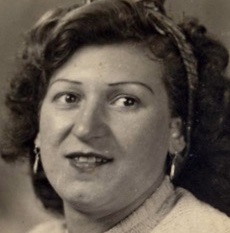
Elisabeth Moyle (nee Arendt) was born August 1929 (will be 93 next month). She married her husband Alfred in the early fifties in Camborne Cornwall and they had four children. Elisabeth worked in a laundry in Cornwall until into her 70s.
Born, one of seven, in Germany into a Catholic family she was only a primary school child at the rise of Hitler and a teenager at the end of the war.
Hers was the town of The Dambusters and she remembers the destruction and flooding caused by the British bombers and the death of her fellow townsfolk. She lost an elder brother at the Russian front and another brother joined the German army – under-age – as the allied forces advanced. They were only reunited years later.
She smoked her first cigarette, given to her at gunpoint by one of the American soldiers security checking the house when she was just sixteen years old.
Her older sister met and married a British soldier whose unit had marched North from Italy. She eventually followed him to Cornwall England, leaving her young baby behind in Elizabeth’s care.
Elisabeth travelled to Cornwall, to reunite mother and daughter. She remained to help out and met local Cornishman Alfred who had served in the army during wartime but had then joined the merchant navy and travelled. They fell in love, married and settled in a small village called Beacon – where she still lives.
Alfred built their bungalow at weekends and evenings whilst working full time. Elisabeth continues to live in the same house and although now alone is lovingly cared for by her daughter who lives nearby.
Alfred unfortunately had severe brain damage after a sudden heart attack in the mid 70s and Elisabeth looked after him devotedly until his death in 79.
She found night shift factory work as she needed to support her dependents, but as a widow moved to day work in the laundry. She enjoyed travelling abroad with friends, loved helping to care for her first grandchild (she subsequently had 6 more), played Bingo and joined in many village activities.
NOTE:- We do not know her favourite song but the following music track was chosen from those of the period which she would have heard regularly.

